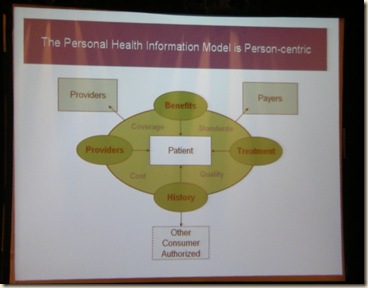Quote of the day:
For a successful technology, reality must take precedence over public relations, for Nature cannot be fooled. - Richard Feynman
At times I have been disappointed in the slow progress of NHIN and RHIOs. However I think about the development of other communications systems. Our national and international telephone networks evolved over many decades, using now obsolete switches, wiring and non digital systems.
The most recent reports reveal some progress and growth of functioning RHIOs even though about seven became defunct in the same time period.
WASHINGTON - Regional health information organizations and health information exchanges may not be the answer to a nationwide network, according to David Westfall Bates, MD, an internist at Brigham & Women's Hospital in Boston who teaches at Harvard Medical School.
Bates, who serves as medical director of clinical and quality analysis of information systems for the Partners Healthcare System (of which Brigham & Women's is a part), says the process of creating and sustaining statewide and regional exchanges has been too slow.
Will RHIOs be able to fulfill the vision of electronic health information exchange across the country? That I think remains to be seen. I think the model is working, but I think the successes have been modest," he said.
Bates spoke Thursday at an online forum organized by eHealth Initiative, a not-for-profit organization that promotes quality care through use of IT. Technology companies 3M and ICW, which work with data exchange organizations, sponsored the forum.
The discussion highlighted early findings of eHI's 2008 survey on health information exchanges. The survey compares the state of exchange organizations in 2007 with 2006.
Jennifer Covich Bordenick, vice president of eHI, told the audience the survey shows there were 32 operational organizations across the country in 2007 compared with 26 in 2006.
Fully operational organizations exchange data on outpatient episodes, lab results, inpatient episodes, radiology results, information on enrollment and eligibility, dictation and transcription, pathology and emergency department episodes.
"There's really exciting stuff happening in these mature organizations," Bordenick said.
The data exchange organizations also reported on the most difficult challenges. At the top of the list - as in 2006 - is developing a sustainable business model.
Most organizations - 53 percent - are receiving funding from hospitals. Forty-four percent say they have funding from the federal government, and 43 percent from state government. Thirty-two percent derive some funding from payers, and 31 percent from foundations and other philanthropic organizations.
Start-up funding is usually less than $200,000.
"Hospitals continue to be a big funder," said Bordenick."They continue to step up and play a major role here."
Westfall said it's possible that hospital funding could "slow things down."
"Enabling clinical data exchange could hurt them competitively," he said.
West raised the possibility of providing more public funding, since RHIOs and HIEs are being created for the public good.
"More organizations are sustaining themselves," Bordenick said. "It's definitely a positive trend. It's slow, though."
next issue: funding for RHIOs and sustainability








